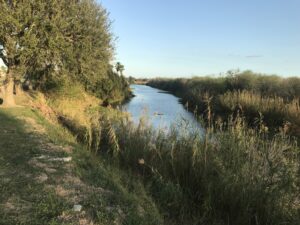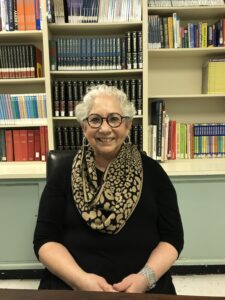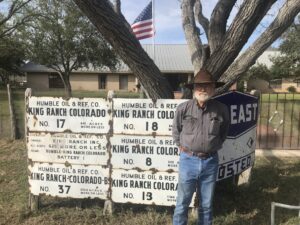
The Rio Grande in Brownsville, TX
The Rio Grande Valley is not a valley at all. For millennia it was one of the continents great alluvial deltas, where flood waters fed by spring snow melts in the Rockies and torrential monsoon rains in the summer flowed down through the deep canyons of the Big Bend country and then, hitting flat lands close to the Gulf of Mexico, spread water, silt, and soil through a maze of every-changing channels and bars.
Today, with the river strangled by dams and sucked down by the demands of people and farms, the grand river creeps sluggishly through Brownsville between low levees, farms, subdivisions, and a here-and-there border wall. Just beyond where I have parked my RV for a week, a decent college long-jumper, with a bit of a run, could launch from the United States and splash down in Mexican waters just beyond the border in mid-“river”.
Thanks to Brian Clyne at Episcopal Day School in Brownsville and my college friend Michael Amini in San Antonio, I had a completely full week of interviews with a wide range of people who grew up in the Valley. Importantly, they represent both Hispanic and Anglo voices in this unique border area that has been a cross-cultural mixing pot for more than 200 years. I can’t possibly share even snippets from all of them in a blog, so here are just a very few quotes from some who shared with me:

Dr. Juliet Garcia, Presidential Medal of Freedom winner
Dr. Juliet Garcia, the first Hispanic woman to be president of a major American university, and recipient of the Presidential Medal of Freedom:
“The Mexican Americans in Harlingen lived literally on the wrong side of the tracks. Even though my grandfather owned property in downtown Harlingen, his home was on the wrong side of the tracks. They could only go to the public swimming pool once a year to swim and the next day they cleaned out the pool.”
“History is written by the conquerors, right? The history I write does not demean your version. But it is a version and it demands to be surfaced and told. My husband and I took our kids to see the Alamo. They were little at the time. We left the Alamo and we watched a little video afterwards about the Battle of the Alamo. And one of my sons asks, ‘Mom at the Alamo, did we win or lose?’ and that was a perfectly sane question! Because what he heard there was, ‘We beat those Mexicans, thank God.”
“The notion of the common good; if we should teach anything, maybe that’s what every class should start out with, what the common good is, just to teach the term, because I think it’s gotten lost.”
Diana Cisneros, daughter of shrimpers; restaurant owner:
“We didn’t identify as Hispanic. We identified as American because that is what we were. When my dad was born, the doctor that delivered him was an Anglo doctor. On dad’s birth certificate, he put ‘Mexican’, he circled ‘Mexican’. We are Hispanic. We are American. I had Anglo friends, and I had Mexican Americans friends and I don’t recall any tension amongst the different groups.”
“We’re not open minded anymore. We have to disagree to agree. We should listen to other people’s point of view and opinions. That doesn’t mean that we have to live by it, but it doesn’t hurt to get other people’s input in life. Maybe it’s another set of ears and eyes that will open up something to you. Politics, religion, things that you don’t talk about with other people, because you know that there is going to be a disagreement or you’re going to have feelings hurt. A lot of people aren’t open to opinions.”
Lucy Garcia Willis: third generation, U.S. born:
“When I was living in a dorm at college my roommates’ grandparents came to visit. They were from La Grange, Texas. Linda Gomez, who was in our dorm came in, and I introduced her to Carol’s grandparents. She put out her hand and they wouldn’t shake it. Another time we had new dorm assignments. Mary Carol was my roommate, we were going to breakfast across the street to the cafeteria. And she said, ‘Well, did you see the new dorm assignments? Laura got some Hernandez or Fernandez.’ And I said, ‘Well, Mary, does she have leprosy or something?’ I said, ‘Mary, I’m a Garcia’ ‘Yeah, but Lucy, you don’t count. We don’t think of you as Mexican’.”
Larry Lof: Cross-border native and biologist:
“My family came here as refugees from Mexico during the Mexican Revolution in 1910. They were only going to stay here until they could go home again to Mexico. But 10 years of revolution meant that they finally had their kids in school. And this finally became home. Somebody seeing me would clearly say, ‘he’s a gringo’. But I didn’t see myself that way. And certainly people who knew me probably didn’t see me that way. Because I was comfortable within the menu of the area, linguistically, culturally, politically.”
“To use a biological term, where you have borders, margins are the richest of environments. But borders can also be a wall that separates completely. We grew up in families that had already become part of a community. We had black eyed peas and ham hocks on New Year’s Day, and we had tamales on Christmas Eve, always, my entire life. So we were already incorporated within our family structure, strong traditional parts of both sides.”
“I don’t think Brownsville is a model; it didn’t consciously evolve this way. It is an imperfect community that has managed to find within itself an equilibrium.“

Mike East at his home on the Santa Fe Ranch north of Linn, TX.
Mike East, current patriarch of Santa Fe Ranch, a portion of the famed King Ranch empire:
“When I was growing up, the vaqueros would call my father Don Thomas, and my uncle, they would call him Don Roberto. That title wasn’t given out free. It was a sign of respect, you had to earn it. They respected my father because they all said he was a very good cowboy. Other ranch owners did not earn that respect. He was hard, but he was fair with the workers.”











Leave A Comment